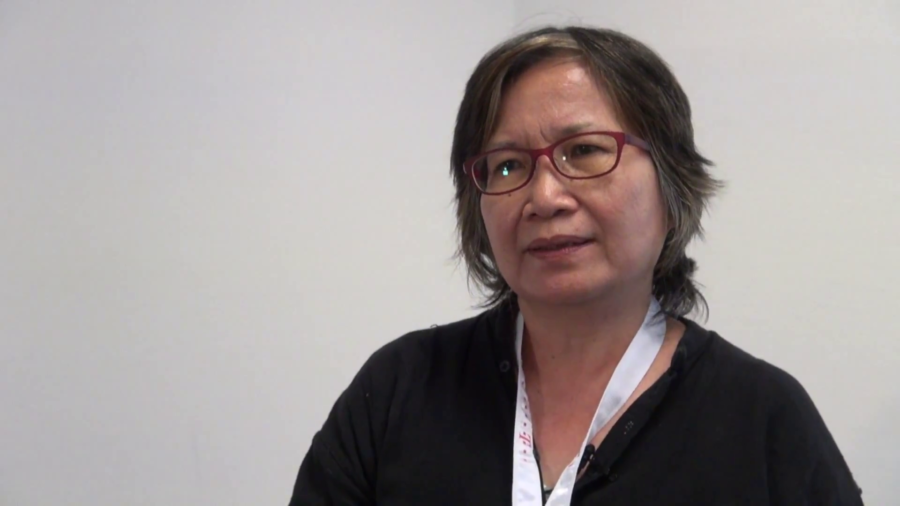Kanchana Kanchanasut: I think my role for the Internet was that I was lucky to be part of the people who spread the Internet through Southeast Asia. I brought the Internet to Thailand. That was the reason why I’ve been recognized.
Intertitle: Describe one of the breakthrough moments or movements of the Internet in which you have been a key participant.
Kanchanasut: That was more than twenty-five years ago. So, at that time nobody knew about the Internet or even to use the existing telephone for email. That type of technology was totally new. So introducing technology to a country which was not aware of the possibility was not easy. It was very tough to do. And once the people started to know about this new technology, the existing telecommunication operators were afraid of the impact on their business. So we had to all the time try to live under that condition, which is not easy. So that was the challenging part of our task, to be able to introduce the technology to the public and at the same time we needed to be able to work out with the telecommunication operator that we have to look for the benefit of the whole country instead of you know, looking at their business alone.
Intertitle: Describe the state of the Internet today with a weather analogy and explain why.
Kanchanasut: I always see the Internet as sunny. You know. There’s so many exciting things that happened throughout the past twenty—almost thirty years for me. And it’s always sunny. Even though there’s many challenging problems, there’s a lot of issues that you never looked at before, and once you have Internet technology coming in, you start to ask yourself and try to clarify with yourself what kind of…the impact of the Internet, which makes you understand your society even better. So I always view this in a positive point of view and I think it’s always sunny.
Intertitle: What are your greatest hopes and fears for the future of the Internet?
Kanchanasut: As it is sunny, I don’t fear anything. I like the sun. [laughs] Because I think you know, whatever technology you bring in, there’s always a negative side of that. And if start fearing that negative aspect which prevents you from doing any other interesting things, I think you are not going the right track. I think the best way is to try to understand a new technology and its impact, and how we can try to accommodate that in our society. And you know, making sure that people would benefit more from the technology than the negative impact.
Greatest hope is that I want the Internet to be…you know, I would like everybody to be able to access the Internet, as cheap as—as basic infrastructure for all. And with that kind of society, you’ll find that many of the problems in our society today should not happen. Like corruption in our government, and [indistinct]. Because things would be more open to the public, and people would find it harder to do things that they used to do in the past. And I think that is the positive aspect of an open society that the Internet brought.
Intertitle: Is there action that should be taken to ensure the best possible future?
Kanchanasut: Right now as you can see there are many organizations that try to address the issue of Internet and society, like the Internet Governance Forum and even the resources on the Internet by organizations like ICANN and so on. So we should encourage people to participate in this kind of process. These types of organizations are new, and they are— The multistakeholder model is new, and it is something we should try to make work. And once that works, I think it’s a good channel where everybody can try to get the best out of the technology for the majority, because it’s the multistakeholder that everybody can get involved in these decision.
Intertitle: Is there anything else you would like to add?
Kanchanasut: At the moment I’m just a normal professor in computer science and I lead a research group that concentrates on networking in post-disaster environments. This type of activity obviously is trying to provide answers to the more frequent natural disasters that are occurring in our region at the moment. So I think that is my role. I don’t focus— I don’t try to predict anything much longer. I just concentrate on today’s interest and that is what I’m doing. I don’t know if that answers your question.
Interviewer: I guess is there anything else you’d like to add about what you think is going to be the future of the Internet.
Kanchanasut: The future of the Internet for me is— I could not say anything specific. But to me, as I kept telling you I see the Internet as always sunny. So to me the future of the Internet is still sunny, and people— If the multistakeholder model works well, I think we are on the right path.
Further Reference
Kanchana Kanchanasut profile, Internet Hall of Fame 2013
